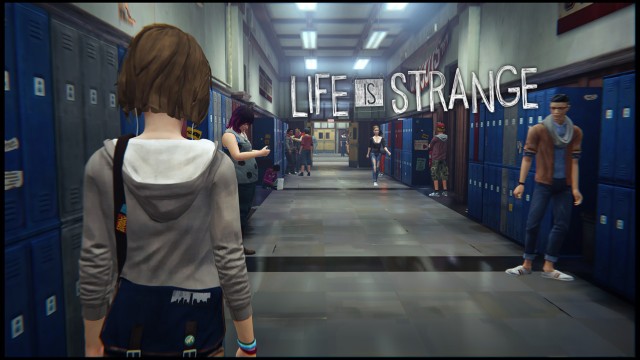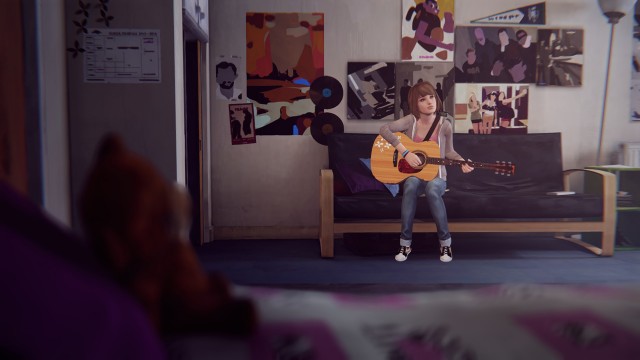I joked on Twitter that Life Is Strange has taught me that twenty-something male critics sure have some deeply held opinions on the speech patterns of teenage girls. It’s the default criticism of this game, “the dialogue is bad”, like “the level design is good” it’s a meaningless criticism when not expanded upon.

My first time through Episode 1 “Chrysalis” I didn’t register there was anything remarkable about the dialogue, there was too many other little touches in the animation and character design that drew me into the world Dontnod had created. Even now, after replaying the first episode, I can see the cracks but I’m still not convinced that the dialogue is unequivocally awful; if anything it’s awkward and clumsy in a way that feels representative of characters who are still emotionally and psychologically struggling with their own identity.
The biggest thing that stands out is the way characters simply say too much, with flat assertions of emotion used in place of subtly or implication; it’s a case of telling rather than showing that gets better as the episode goes on, and is fortunately largely non-existent in later episodes. A large reason for this is due to the reliance on Max’s internal monologue which is trying to both convey information to the player and build up a picture of her character. During her voiceovers there is a confusion between Max as narrator and Max as character, she talks about subjects that should be familiar to her as if she is experiencing them for the first time; it’s the “As you know…” trope as internal monologue.
As part of this desire to explain the world to the player every character use overly specific language with repeated uses of Max Caulfield’s full name in what are contextually framed as informal circumstances. Proper nouns are used in their complete form rather than being replaced with a more natural shorthand and relying on the audience to make the connection. Nobody would say “Blackwell Academy” every time, when “Blackwell” provides exactly the same information in a less forced manner and “school” is even more natural, though potentially less likely to be used by eighteen year olds as it carries associations of childhood.
A lot of the problems with the overly didactic dialogue choices are lessened in the subsequent episodes as Dontnod appear to grow more comfortable with the player’s place in the world and more confident in their own ability to present information indirectly.
For all its missteps in dialogue and distracting lip-syncing mishaps, so much of Life Is Strange feels human and honest in a way that few games have. I was never a teenage girl and I don’t know how different that experience is to my own but large parts of Life Is Strange were uncomfortably evocative of the anxiety I suffered from about sixteen to twenty five.
Something I can speak to is being an eighteen year old, and a particularly snarky and awkward one at that. Eighteen years olds are weird, and really fucking irritating. I’m thoroughly unconvinced by anybody who thinks they were anything but a self-absorbed asshole at eighteen. Everything is important when you’re eighteen, except the things you don’t care about which are all trivial bullshit. Everybody is having more sex than you. Is more popular than you. Is more self-assured than you. Being eighteen, nineteen, practically anything up to twenty five is just a permanent state of imposter syndrome; a state some never escape from.
It’s far from rare for teenagers to have screwed up perceptions about the relative worth of knowing certain things. Being able to name your idols feels important and mature, it’s a way to show you have tastes and care about something in a deeper, less childish way. I remember doing just that in my first year at University, knowing who John Carmack or Doug Church were if others in my Game Programming class didn’t made me feel special, superior. I’d judge others based on what books they’d read or what music they listened too. I genuinely once decreed that “I could never be friends with somebody who hadn’t read The Hitchhiker’s Guide To The Galaxy“. The media I consumed then, the things I cared about, felt so important that they were definitive, I simply couldn’t comprehend associating with people who didn’t share those very specific tastes.

I don’t have much direct interaction with people in their early twenties but I do live in a University city and am often in pubs or coffee shops where students gather and so much of their conversation is littered with particular words or turns of phrase that seem to fill the role of punctuation. I say this about students but I know it’s true of myself. I find I’ve got a casual speaking vocabulary that’s essentially thirty words and they include anachronisms like “doozy” and “moron” that as far as I remember weren’t even fashionable or popular in my own lifetime; I’ve no idea where I’ve picked them up.
I self identified as a geek growing up and I understood terms like “preppy” and “jock” and applied them, despite both of those labels coming exclusively from television and having a heritage in a culture that I was not a part of. I’m sure if I’d ever heard the term “hipster” when I was eighteen I’d have delighted in using it whenever I had the chance. Labels are really fucking important when you’re developing your own identity and worldview, and labels that have some degree of cultural cachet, either by dint of their use in pop culture or by older (but not old) people, are even more important.
There are few betters ways to highlight your own maturity than to mimic what is presented to you as mature.
It was only when I reached my late twenties that I realised how obsessed I had been with the notion of maturity; an obsession clung to most fiercely by those who exhibit it least.
I don’t know how I’d react in Max’s place, but I’ve experienced some (fortunately minor) traumatic events in my life and “acting normally” was one of the only ways I could find to keep going. Emotional autopilot, you keep up your expected cultural performance as you always have because it’s the one thing that’s remained constant.
If I ever gained the power to rewind time there’s a lot I’d want to change but I know what eighteen year old me would have done. Rewinding time is an awkward teenager’s ultimate superpower, even if I could have saved the world I’d more than likely have used it just as much to avoid looking uncool.